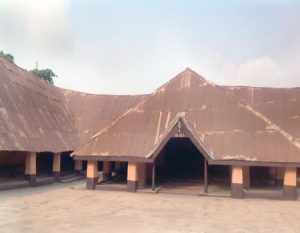
Deji; of Akure, traditional title of the Oba of Akure. Royal lineages in Akure trace a common ancestry to Asodeboyede, the first Oba of Akure, who reigned from 1150 A.D to 1180 A.D. As believed by a session, there should be only one Ruling House in Akure. And this had been since 1576 A.D, until 1989 when government recognised the Osupa Ruling House. Earlier, the long- established second ruling house, the Alakure, is believed to have become extinct after 1576 A.D. All subsequent Dejis have traced their roots to Asodeboyede. But at the core of the controversy is the well known dominance of the Adesida dynasty of the Deji stool. Although the first Adesida to ascend to the throne, Oba Afunbiowo Adesida I, was the 41st Oba of Akure, his descendants have maintained an unbroken grip over the Deji throne since 1897. That, perhaps, had prompted the descendants of Dejis who reigned before him to start agitating for a change of the chieftaincy regulations. Chief among the agitators who began their campaign in the late 1970s was Ige Ogunleye-Aladejana, a London-trained medical doctor, and a grandson of Oba Osupa, who reigned between 1834 to 1846, before Adesida I. Others were the Ifaturotis, descendants of another Deji.
The long dominance of the Adesidas is explained by the long reign of Oba Afunbiowo Adesida I, who reigned for 57 years, from 1887 to 1957. And since by tradition, only a son born to a Deji on the throne could ascend to the throne, the sons of Adesida I quite naturally had an edge. Thus began the long chain of four Adesidas who succeeded one another on the throne. But by 1987, succession had become very contentious with the agitation by the descendants of other past obas for a shot at the throne. With the demise of Oba Adelegan Adesida, another Adesida, Adebobaji raised contention. It is alleged there was an agreement by Prince Adebobajo and the Osupas on one hand, which allowed Adebobaji the next Deji, while in the other sources reportedly consented to the arrangement that the Osupas will produce the succeeding Deji. To fortify the agreement, Ondo State government under Captain Michael Olukoya, promulgated Deji of Akure Chieftaincy Declaration of 1991, which recognised two ruling houses: Ojijigogun and Osupa. The deed further stated that these two would become the Deji by rotation.
When the Deji, Oba Adebobajo Adesida died in November, Ojijigari Osupas were supposedly in good stead to produce the next Deji. The Governor Adebayo Adefarati administration, consistent with this provision, directed Akure South Local Government accordingly. In turn, in February, the government chairman, Iyiola Akinhd wrote to the Akure kingmakers, led by Olisa of Akure, Folarunsho David, for Osupa Ruling House to present their candidate. This led to the emergence of Adegbola Adelabu, a wealthy businessman, and founder of a theological school, as Deji-elect in March. But the 11- suit by the Ifaturotis, which was rekindled, did put a spanner in the arrangement, halting Akure indigenes’ hope of a new Deji in a short while.
A part of the Ojijigogun Ruling of the Adesidas during the Morgan Commission set up by the military administration of the old Western State, Brigadier Rotimi to look into various disputes in the state, including that of the Deji of Akure. The Morgan Commission proposed three ruling houses: Adesidas, Ifaturotis and Adetosoyes. However, the Adekunle Ajasin administration did not approve this. The bone of contention afterwards is that the declaration of 1991 nullifies the 1957 model[i]. Dare Adesina, a London-based prince, was elected as the new Deji designate of Akure, Ondo State, by kingmakers in November 2005. Adesina polled nine votes to beat Kola Aladetoyinbo, who scored five votes while the other three contestants — Femi Adejuyigbe, Adeolu Adepoju and Kayode Adegbite — had no votes. The race to the throne started in 1999 when the last occupant, Oba Adebobajo Adesida became late[ii].
While the Adesida royal family from the Ojijigogun ruling house in the town wanted to fill the stool, the other ruling house, Osupa/Odundun believed that having ruled for 104 years uninterruptedly, the Adesida family should step aside and allow others to rule the town. Eventually, when the dust raised by where the next Oba should come from settled, it was agreed that the Osupa ruling house should produce candidates for the stool and after some manoeuvrings and lobbying, the 18 kingmakers in Akure settled for Prince Adegbola Adelabu, popularly known as Ileri Oluwa. The man had already commenced the traditional rites for his installation as the Oba when opposition to his installation mounted, leading to the nullification of his nomination. Some people from the same ruling house had approached the court to stop his installation. After much dilly-dallying and when it became obvious that Adelabu would not assume the throne, the Ondo State government declared that the selection process should begin anew. Adelabu lost out while fresh contestants emerged. It was at this stage that Oluwadare Adepoju Adesina from the Osupa ruling house came to lime-light. When the process began, many people in the town had thought that one of the forerunners in the contest, Kole Aladetoyinbo, would be chosen as he was the most visible and popular of the all candidates, again, they were wrong. The kingmakers settled for Adesina and he was eventually presented with the staff of office by the state government in November 2005. This was the beginning of a reign which eclipsed on Thursday, June 10 effectively after a street fight as an Oba on Sunday, May 30, 2010 when he publicly battered his wife, Bolanle hence drawing wide condemnation. The state government pronounced him deposed and banished, ending his almost five-year reign[iii].
[i] TELL May, 2000
[ii] TELL November 14, 2005
[iii] Tribune, July 17, 2010
